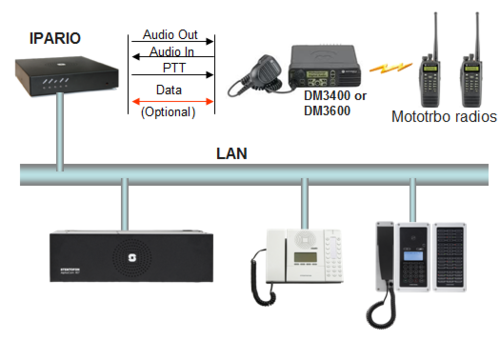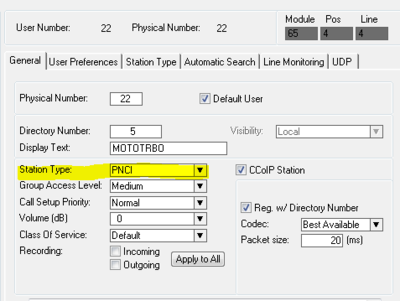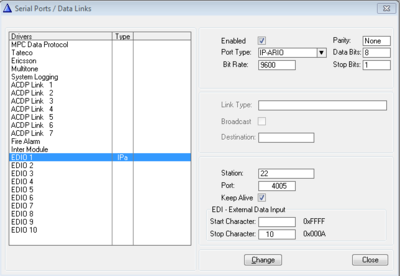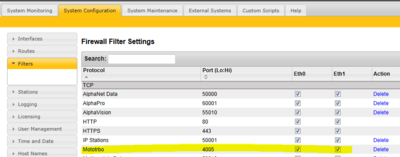Mototrbo and AlphaCom interfacing: Difference between revisions
From Zenitel Wiki
| Line 43: | Line 43: | ||
Configure the IP ARIO to register to the AlphaCom using directory number 5, see describtion in the [[IP-ARIO|IPARIO article]]. Note that an [[Licenses#IP-ARIO_Audio_License|IPARIO license]] is required in the AMC-IP. | Configure the IP ARIO to register to the AlphaCom using directory number 5, see describtion in the [[IP-ARIO|IPARIO article]]. Note that an [[Licenses#IP-ARIO_Audio_License|IPARIO license]] is required in the AMC-IP. | ||
[[File:IPARIO Users.PNG|thumb|right|400px|IP-ARIO configuration]] | [[File:IPARIO Users.PNG|thumb|right|400px|IP-ARIO configuration]] | ||
* In '''Users & Stations''' -> '''General''' tab, set Station Type = PNCI. This to allow | * In '''Users & Stations''' -> '''General''' tab, set Station Type = PNCI. This is to allow further dialing while connected to the IP-ARIO, without the digits being intepreted by the AlphaCom. | ||
* In the '''Station Type''' tab, enable "Request for Audio License". | * In the '''Station Type''' tab, enable "Request for Audio License". | ||
<br style="clear:both;" /> | <br style="clear:both;" /> | ||
Revision as of 12:48, 23 October 2012
This article describes how the AlphaCom can be integrated to the digital radio system MOTOTRBO from Motorola. Most suitable radio model is DM3600 (display model), but for basic functionality also DM3400 can be used. The interface between AlphaCom and the MOTOTRBO radio is the IP-ARIO unit.
Functionality
Increased functionality is achieved when using data communication between the AlphaCom and the MOTOTRBO radio. The MOTOTRBO Extended Control and Management Protocol (XCMP) allows the AlphaCom to control and manage the MOTOTRBO radio. If more than groupcall functionality is required, an XCMP converter model DMR621 from Motorola is required. The converter is connected to the serial port on the IP-ARIO (RS232) and to the accessory port on MOTOTRBO radio (USB).
Without XCMP converter
- Without the XCMP converter intercom stations in a Simplex Conference can communicate with a Group Call in the MOTOTRBO radio system. There will be no caller ID in the intercom stations.
With XCMP converter
With the XCMP converter and EventHandler configuration the following functionality has been tested:
- Groupcall in fixed group (M-key is PTT)
- Semi-duplex (Press To Talk) private call to selectable MOTOTRBO radio
- Incoming private call from a MOTOTRBO radio to predefined intercom station. Call to selectable intercom station is not supported.
- Send text message to a preselected MOTOTRBO radio
- Display of Caller ID
Connections
Connections between the MOTOTRBO radio and IP-ARIO:
- RX audio to Radio IN (Motorola 770 mV nom.)
- TX audio to Radio OUT (Motorola 80 mV nom.)
- PTT to RCO output (active low)
- Audio is asymmetric, DC-block capacitor is required in TX audio line to radio.
- Ignition input of the radio needs to be connected to +12V to power-up the radio automatically.
- Optional: XCMP converter. The adapter is connected to the serial port on the IP-ARIO and to the accessory port on MOTOTRBO radio (USB).
Configuration
Pre.---
- IPARIO is using directory number 5
- RCO 22 is used for keying of the radio transmitter
- Simplex Conference 1 (8201) is used for radio listen/talk
- UDD 500:
- UDD 501:
- UDD 502:
- UDD 503:
- TCP/IP port 4005 is used for communication between AlphaCom and IP-ARIO
IP-ARIO configuration
Configure the IP ARIO to register to the AlphaCom using directory number 5, see describtion in the IPARIO article. Note that an IPARIO license is required in the AMC-IP.
- In Users & Stations -> General tab, set Station Type = PNCI. This is to allow further dialing while connected to the IP-ARIO, without the digits being intepreted by the AlphaCom.
- In the Station Type tab, enable "Request for Audio License".
Configure the EDIO 1 port of AlphaCom to use the RS232 serial port of the IP-ARIO:
- In Exchange & System -> Serial Ports, select EDIO 1, and set the following parameters:
- Port Type: IPARIO
- Bit rate = 9600, Parity = None, Data bits = 8, Stop bits = 1.
- Station = Physical number of the IPARIO
- Port = 4005. This is the TCP/IP port used between AlphaCom and the IPARIO. Note: This port must be defined and opened in the Filters settings in AlphaWeb.
- Keep Alive = Enabled
- Stop character = 10
Outgoing call to radio:
In Users & Stations, set the radio interface (IPARIO or FBSAR) to Station Type = PNCI. This is to allow further dialling while connected to the interface, without the digits intepreted by the AlphaCom.
Event:
Event Owner: Stations w/UDP 8 (all stations) Event type: 25 - Event trigger with parameter Subevent: 255 When Change To: ON When Related To: The IPARIO interface Action: WUDD 501 %op(%udd(501),+,1) WUDD 502 %sev WUDD 503 %op(%op(%udd(503),*,10),+,%udd(502)) IF %op(%udd(501),=,4) $DSPL L%1.dir U19 031354 'Call: %udd(503) M=PTT' EDO 1 "AT+CCR=1,4,1,%udd(503)\r" LOG "=> AT+CCR=1,4,1,%udd(503)" WUDD 504 1 ENDIF
EDIO 1 is used to receive data from the Mototrbo radio:
Event:
Event Owner: EDI Text Config Event type: 28 - EDI Text Subevent: 1 When Change To: N/A When Related To: N/A Action:
LOG "<= EDI %sev: %edi" TMP 0 "%sscan(%edi,+)"
IF %scmp(%scutf(%TMP(0), ,0),+XCMP-CALLCTRLBRDCST) TMP 1 "%scutc(%TMP(0),21,0)" TMP 2 "%scutc(%scutf(%TMP(1),\,,0),9,0)" TMP 3 "%scutc(%scutf(%TMP(1),\,,1),10,0)" TMP 4 "%scutc(%scutf(%TMP(1),\,,2),11,0)"
LOG "=> EDI %sev: Call from: %TMP(2)" LOG "=> EDI %sev: Call Type: %TMP(3)" LOG "=> EDI %sev: Call State: %TMP(4)"
IF %op(%TMP(4),=,1) WUDD 5 1 LOG "=> EDI %sev: New Incoming call" $DSPL L103 U19 031314 'CH %sev: %TMP(2)' $DSPL L104 U19 031314 'CH %sev: %TMP(2)' $DIP L103 "dici 1" $DIP L104 "dici 1"
IF %udd(301) LOG "=> EDI %sev: Patch start" IF %op(%TMP(2),>=,203) $CONF_TALK L11%sev U3 U1 IND 13 %op(16,+,%sev) 2 3 ON LOG "$CONF_TALK L11%sev U3 U1" ENDIF ENDIF
IF %op(%udd(301),=,0) $VOX 01 L820%sev ENDIF
ENDIF
IF %op(%TMP(4),=,2) LOG "=> EDI %sev: Call in progress" $DSPL L103 U19 031314 'CH %sev: %TMP(2)' $DSPL L104 U19 031314 'CH %sev: %TMP(2)' $DIP L103 "dici 1" $DIP L104 "dici 1"
IF %udd(301) IF %op(%TMP(2),>=,203) $CONF_TALK L11%sev U1 U1 IND 13 %op(16,+,%sev) 2 3 ON LOG "$CONF_TALK L11%sev U1 U1" ENDIF ENDIF
ENDIF
IF %op(%TMP(4),=,3) WUDD 5 0 LOG "=> EDI %sev: End of Call" $DSPL L103 U19 031314 $DSPL L104 U19 031314 $DIP L103 "dici 1" $DIP L104 "dici 1"
IF %udd(301) IF %op(%TMP(2),>=,203) $CONF_TALK_STOP L11%sev IND 13 %op(16,+,%sev) 2 3 OFF LOG "=> EDI %sev: $CONF_TALK_STOP L11%sev" ENDIF ENDIF
IF %op(%udd(301),=,0) $VOX 00 L820%sev WUDD 5 0 ENDIF
ENDIF
IF %op(%TMP(4),=,7) LOG "=> EDI %sev: Call ceased: %TMP(2)" IF %udd(301) IF %op(%TMP(2),>=,203) $CONF_TALK_STOP L11%sev IND 13 %op(16,+,%sev) 2 3 OFF LOG "=> EDI %sev: $CONF_TALK_STOP L11%sev" ENDIF ENDIF ENDIF
ENDIF




